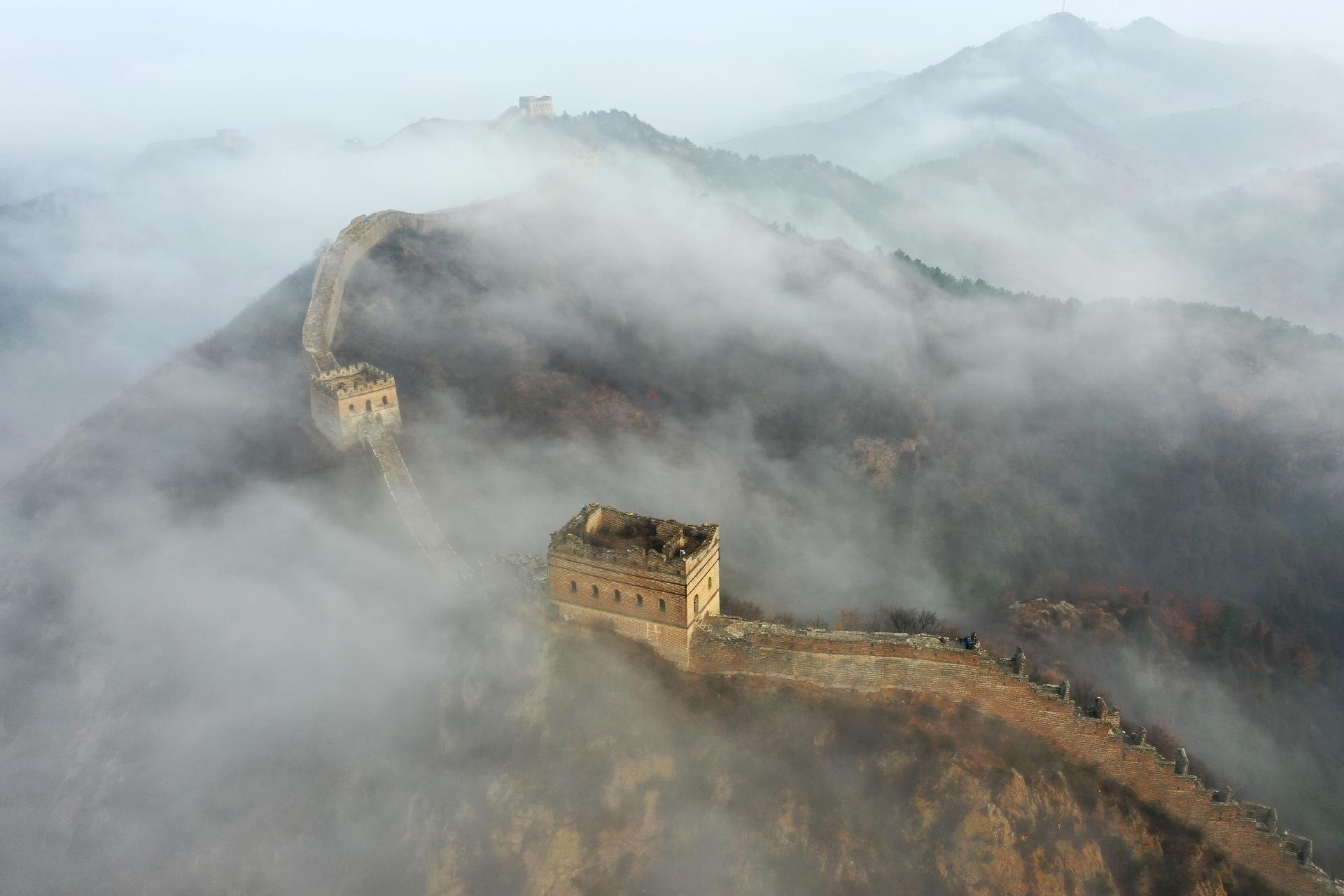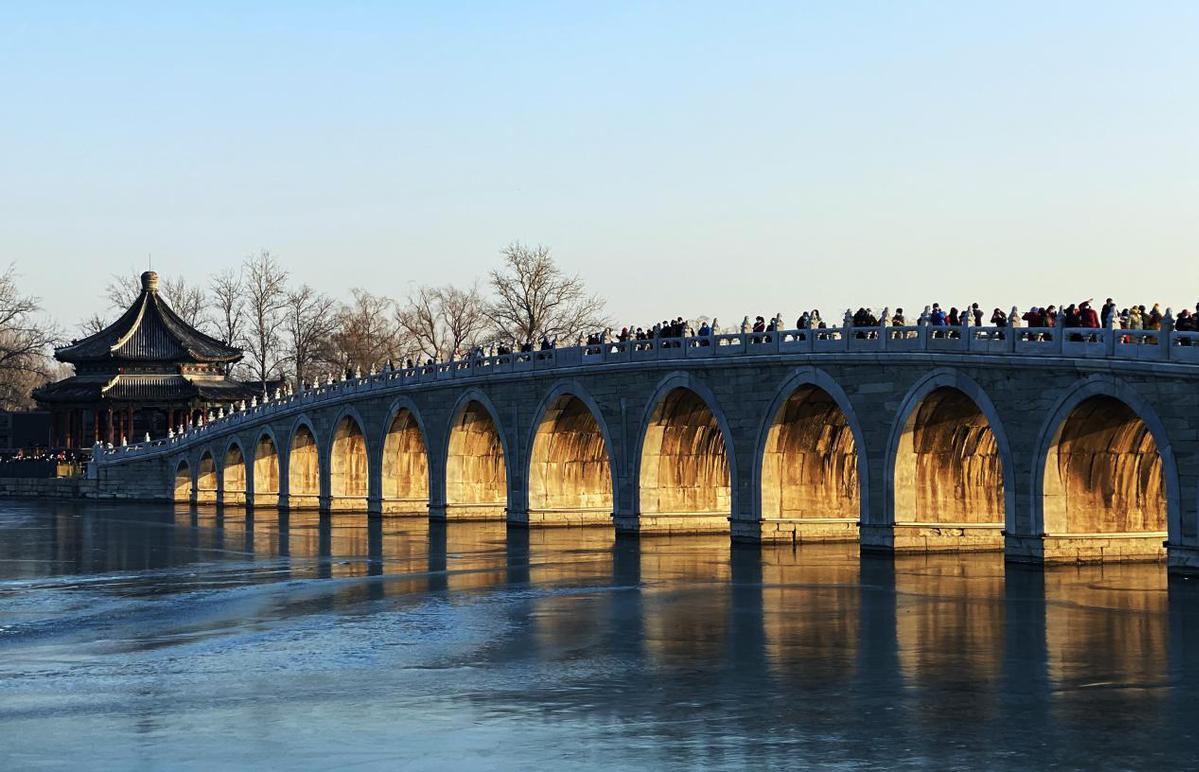《古都北京》多语种系列图书,由中国外文局所属朝华出版社于1986年首次出版。本书以断代史的体例记述了北京自北京人至今约70万年的历史发展脉络,既有对北京历代文化遗迹的专业描述,也有对坊巷市俗、岁时节令等市民生活的记录,是历史学家阎崇年三十年潜心之作。全书内容系统全面,结构清晰紧凑,并配有700余幅著名摄影家严钟义等人拍摄的高清精美图片。我们从中选取了一批双语重点词汇及例句,和大家分享。
1. 御花园
Imperial Garden
例句:北京城的园囿——宫城的御花园、皇城的太液池、内城的坛庙苑林、近郊的三山五园,也都布局有序,呼应相连。译文:The same philosophy applied to the layout of the gardens and parks, including the Imperial Garden in the Forbidden City, the Taiye Lake in the Imperial City, the altars and temples in the Inner City, and even the “Three Hills and Five Gardens” in the western suburbs.
2. 关隘
Pass
例句:古北口为北京北部的咽喉之地,也是万里长城的重要关隘。译文:Gubeikou, a strategic gateway north of Beijing and an important pass of the Great Wall, was built in the Ming dynasty.

这是3月13日拍摄的金山岭长城云雾缭绕的景观(无人机照片) 。
3. 石经
Buddhist scriptures on the rocks
例句:隋朝开凿京杭运河和勒刻房山石经,于北京的物质与文化都有不可估量的意义。译文:The economic and cultural development of Beijing was speeded up by two events — the building of the Grand Canal and the carving of Buddhist scriptures on the rocks of present-day Fangshan in Beijing’s suburbs.
4. 帝王树
Imperial Tree
例句:(潭柘)寺内的一棵银杏树,相传植于辽代,树龄已近千年,高30余米,围约7米,清乾隆帝封其为“帝王树”。译文:The 1000-year-old gingko tree, about 30 meters high and seven meters in perimeter, is said to have been planted in the Liao dynasty. The Qing emperor Qianlong gave it the name of “Imperial Tree.”
5. 礼拜殿
The Prayer Hall
例句:全寺建筑集中对称,主要建筑有礼拜殿、梆歌楼、望月楼和碑亭等。礼拜殿为全寺的中心,是伊斯兰教徒做礼拜的殿堂.译文:The mosque has a concentrated and symmetrical layout. The main buildings include the Prayer Hall, the Minaret, the Tower for Observing the Moon, and two Stele Pavilions.
6. 石拱桥
stone arch bridge
例句:金章宗明昌三年(公元1192年)三月,费时三年的卢沟石桥终于落成,命名为广利桥,后习称为卢沟桥。元、明、清三代曾加以修葺。卢沟桥是一座联拱石桥,长266.5米,宽7.5米,下分11个涵孔,工程巨大,雄伟瑰丽,是中国北方最长的古代石拱桥,也是北京现存最古老的联拱石桥。译文:It took three years to complete the Lugou Bridge, otherwise known as Marco Polo Bridge, in 1192 under Emperor Zhangzong of the Jurchen dynasty. Being 266.5 meters long and 7.5 meters wide, the stone bridge has 11 arches. Renovated under the Yuan, Ming and Qing dynasties, it was the longest stone arch bridge in North China in those days and remains the oldest one in Beijing today.
7. 简仪 abridged armilla
圭表 colossal gnomon
例句:郭守敬是一位勇于创新、勤奋好学的科学家。他在前人基础上设计制造了测量赤道坐标和地平坐标的简仪,并制造了测量日影长度的圭表等天文仪器。译文:Guo Shoujing (1231-1316), an outstanding scientist, improved on the astronomical instruments developed by his predecessors and built an “abridged armilla” for measuring equatorial and horizontal coordinates. He also built a colossal gnomon for measuring the shadow of the sun.
8. 瓷器 porcelain
青花瓷器 blue-and-white porcelain
例句:元大都的瓷器汇聚了元代瓷器的精粹。元代瓷器的特点是以青花瓷器为代表作。译文:The porcelain of Dadu was among the best produced under the Yuan dynasty, typical of which was celadon or blue-and-white porcelain.
9. 护城河
the moat
例句:元大都大内宫后御苑没有山。明初中都城后面和南京宫城后面皆有山做屏障。明北京城规划汲取明中都和明南京均有后山的格局,并运用风水理论,将宫城护城河中挖出的黄土堆筑到宫后御苑,形成高49米的万岁山(又称煤山,清改称景山)。译文:There had been no hill in the Imperial Garden of the Yuan dynasty. In the early years of the Ming dynasty, the “Forbidden City” in Nanjing leaned against a hill at its back. The palace zone in Beijing was given a similar feature. The earth excavated from the moat around the Forbidden City was used to build a 49-meter-high hill in the Imperial Garden, which was called His Majesty’s Hill under the Ming and changed to the Jing Hill under the Qing.
10. 九龙壁
The Nine-Dragon Wall
例句:宫前的九龙壁,其下部为白石须弥座,上部为黄瓦庑殿顶,中间为九条巨龙浮雕,体态矫健,形象生动。全幅壁面以海水为衬景,有9条戏珠巨龙在奔腾,它由247块预制七色琉璃砖拼砌而成,总宽29.4米,高3.5米。译文:The Nine-Dragon Wall is a glazed-tile screen wall in front of the Palace of Peace and Longevity, It rests on a sumeru base of white stone and is covered with a yellow-tiled roof in palace style. The nine huge dragons in bas-relief are playing with balls against a backdrop of sea waves. They look vigorous and come to life. The surface of the screen wall is composed of 247 glazed tiles in seven colors, adding up to 29.4 meters in width and 3.5 meters in height.
11. 九龙宝座
nine-dragon throne
例句:殿内中央九龙宝座,是慈禧太后过生日时接受光绪帝及群臣朝贺的座位。译文:Hall for Dispelling Clouds in the Summer Palace. At the center of the hall is a nine-dragon throne where Empress Dowager Cixi received greetings from Emperor Guangxu and the officials on her birthday.
12. 十七孔桥
Seventeen-Arch Bridge
例句:南湖岛和东堤之间,横卧在昆明湖上的是人造长虹十七孔桥。桥长150米,宽8米,由17个券洞组成。桥面石栏望柱上共雕有形态各异的石狮500余只。译文:Between the South Lake Island and the East Causeway is the rainbow-like Seventeen-Arch Bridge on the Kunming Lake. The bridge is 150 meters long and eight meters wide. The balusters are decorated with more than 500 stone lions which differ from one another in posture.

2020年12月21日,太阳光穿过十七孔桥形成著名的“金光穿洞”景观。(图片来源:中国日报网)
13. 四合院
square courtyards
例句:北京居民的四合院,最大的要算是诸王府邸。明代的皇子,成年以后分藩外地。译文:Among Beijing’s square courtyards the largest ones were the mansions of princes. Princes of the Ming dynasty would be granted vassalages scattered around the country as soon as they grew up.
来源:中国外文局








